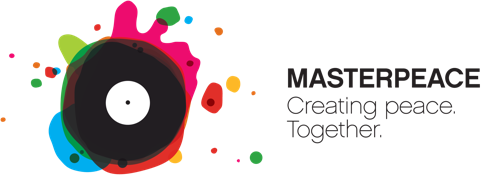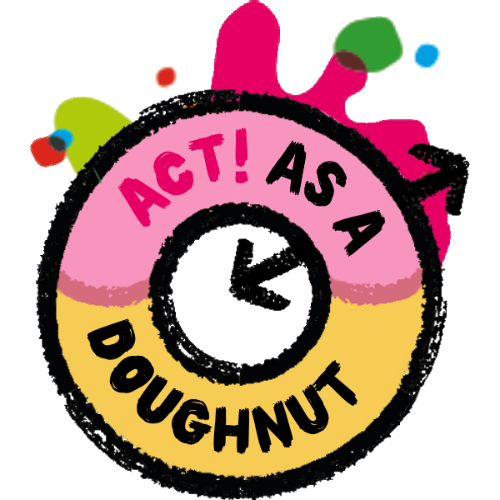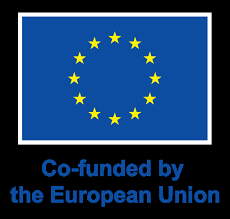Act as a Doughnut

masterpeace
Our EU-co-funded project, “ACT as a Doughnut,” is finalized and shared with the broader network of partners in 40+ countries. Partners in Morocco, Croatia, Lebanon, and Kosovo are currently reusing and upgrading all materials and tailoring our approach to the local MENA region context. We are extremely proud of this result. Our societies face multiple crises: climate and environmental, increasing gaps between those who “have and have not,” lack of (jobs) perspective, (Im-) migration, and a generic distrust in institutes, especially amongst our “Gen Z” youngsters.
ACT as a Doughnut is our quest to find a creative and innovative answer to youngsters’ lack of engagement in taking action, creating their own future, and building together a sustainable urban context. Our needs analyses showed that all partners lacked appropriate non-formal educational materials.
Together, we took this 30-month journey to discuss, learn, share, and tailor global concepts like Artivism and DOUGHNUT Economy Materials to youth work and education. We believe, with the help of our friends at https://community-arts.net/ and https://doughnuteconomics.org/, we are among the first globally to pilot these concepts

ACT as a Doughnut aimed to engage, connect, and empower youngsters to be active citizens and co-create “their “thriving city. We developed educational materials and trained youth workers who trained local associated teachers in the domain of social science/citizenship. Their students created a city portrait and used the power of imagination to imagine what their thriving city would look like. Second, based on education materials, they advised active citizens of their city on the best next steps.
Our primary target groups are youth workers, students aged 15- 19 years, and their teachers. Our secondary target groups are city representatives and Associated Partners. All youngsters deserve a quality education and ACT to create their future. We knew by experience and are backed by reports that we faced gaps in all five countries.
Our main objective is to boost youngsters’ positive and active participation to create a sustainable future in their local community based on shared (EU) values.
We developed Non-Formal Educational materials to;
- be used by youngsters on social cohesion AND environmental challenges; they run projects and realize their inclusive democratic participation;
- support teachers on new key competencies, create a new curriculum and co-create transnational insights
Our sub-objectives:
- creating innovative curricula or courses using creativity, arts, and culture
- learn about social inclusion within the boundaries of our planet
- grow didactic and educational skills via blended learning (development of key competencies)
- to engage youngsters to start community projects and provide feedback as co-creator of new education formats (inclusive democratic participation)
- to build an ecosystem with the students as an accelerator in co-creation with their community and local government for sustainable change
- to pilot the Doughnut theory in Education
- to grow the network of Arts for social change via Education
Result 1 “Engage, connect and Empower” handbook; a ready-to-use and scalable handbook/ with Non-Formal educational materials in 6 languages. (Dutch, English, German, Polish, Romanian, Slovakian,
Result 2: An online “train the trainer” course is being offered; youth workers and teachers are trained. The course is scalable and available online in six languages.
Result 3 “ACT as a Doughnut community projects”; ca 60 students per country (in total 300) implemented (split in 5 teams) projects in their communities and chose out of the five categories of the Doughnut theory (so per country 5, in total 25 projects);
- a) “Empowered” (focusing on the topics of Peace & Justice, Social equity, Political Voice, and Equality in Diversity);
- b) “Connected” (focusing on the topics of connectivity, community, mobility, and culture);
- c) “Enabled” (focusing on the topics jobs, income, education, and energy)
- d) “Healthy” (focusing on the topics of health, housing, water, and food)
- e) “Local-ecological”- (the environmental dimension)
The local community in their city experienced the ideas that the students put into action (via the 5 projects) and representatives of the city gained insight into the ambitions of their youngsters and learned that youngsters can become active citizens and co-create to realize the local strategies
Result 4: ACT Relay; Students learned from their peers in other countries, deepened their understanding of the contexts in the five countries and their own insights into how to create a thriving city, and finalized the 25 recommendations (5 per category) for their city representatives. In total, we received 125 recommendations.
Result 5: ACT in Education Lab (Knowledge Platform) Our methodology, the lessons learned in general, and the 25 recommendations per city were shared on our platform that is linked with the CAN and DEAL knowledge base. 5 City portraits were also shared on this and the DEA platform
Moreover, feedback from participants showed a great impact in quantity and quality:
– The projects guided by youth workers and teachers involved ca. 300 students
– The 5 multiplier events hosted 150 stakeholders to foster the ecosystem needed for transformation
– Education proved to play a responsible role as a driver of transformation in their cities.
– Youth workers grew in impact as they grew their skills and quality formats for social innovation
– Teachers gained didactic and personal skills and learned how to use a broader education portfolio relevant to a digital era
– Students were engaged and empowered as they ran innovative projects and embraced the co-creator role of blended formats.
Our follow-up strategy, as described below in this report, resulted in unique scalability potential as we shared this on a global level with NGO’s in 40+ countries via the MP NL network and the partners in their regional and national networks.
We express our gratitude to our local funders and EU as main co funder to enable and facilitate these scalable results.
Partners


